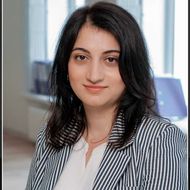Media Bridge Between St Petersburg and São Paulo: HSE University-St Petersburg Holds Online Seminar on Journalism
The Department of Media at HSE University-St Petersburg and the Department of Journalism at São Paulo State University (UNESP, Brazil) jointly hosted a research seminar covering the role of mass media in shaping the image of BRICS countries. The participants discussed problems that journalists have to face in Russia and Brazil when covering the activities of the organisation.
.png)
The online seminar 'BRICS Coverage in Mass Media: Perspectives of Brazil and Russia' was organised by the Department of Media (HSE University-St Petersburg School of Arts and Humanities) and the Department of Journalism (UNESP School of Architecture, Arts, Communication and Design). The event continued the cooperation, which started in spring 2025 during the visit of the HSE University-St Petersburg delegation to the Brazilian university. The participants created a platform for a dialogue between Russian and Brazilian media experts and discussed stereotypes that journalists have to face when covering BRICS activities and international relations.
The seminar started with the speeches by Francisco Rolfsen Belda, UNESP professor, and Oksana Arutiunian, head of the Department of Media at HSE University-St Petersburg. They emphasised the necessity to improve direct communication between media communities of BRICS member states.
Danilo Rothberg, professor of the sociology of communication at UNESP, underscored that the main task for the specialists in the media sphere was to reach unity in the contexts of the BRICS countries' agendas. According to him, mass media strongly influence public opinion, political discourse, and international relations, so the success of an organisation requires balanced coverage, which takes into account the interests of all the alliance members.
Anton Vilchinsky, correspondent and translator at TASS, focused on the issues of educational cooperation within BRICS. In his speech, he drew attention to the lack of direct dialogue between the mass media of the alliance members. The expert believes that it's vital to create a unified information platform with news about education, a bank of joint courses by universities of BRICS countries, as well as a platform for journalists' cooperation.
Igor Patrick, observer of the Brazilian newspaper 'Folha de S.Paulo', shared his experience of working as a correspondent in China. He thinks that to shape the objective news agenda and systematic cooperation, BRICS members have to create specialised institutes for studying the historical context, language, and socio-economic structure of the alliance countries.

Valeriia Gorbacheva
Deputy Head of the BRICS Expert Council-Russia, Head of the Multilateral Strategic Projects Office at HSE University
Regular coordination of positions with experts helps to reduce an information vacuum, which still exists between our countries, regardless of active cooperation. Within BRICS, it is vital to maintain networking at all levels. That is why such events, aimed at mutual exchange of opinions with professors teaching future journalists in BRICS countries, contribute to establishing a sustainable dialogue and continuity of generations.
Summing up, the speakers underscored the growing significance of BRICS in political and economic contexts. The participants agreed to deepen cooperation in the media sphere, coordinate a joint agenda, paying attention not only to politics and economics but also to cultural and educational partnerships.

Oksana Arutiunian
Head of the Department of Media at HSE University-St Petersburg
The main goals of our joint academic initiative are to create an expert and analytical platform for a direct dialogue between scientists, media researchers, and practicing journalists from both countries and to hold a comparative analysis of media agendas. In the framework of the event, we have completed the set tasks, and I hope this seminar will become a starting point for new projects.

